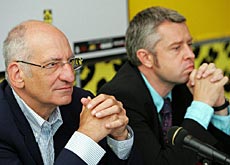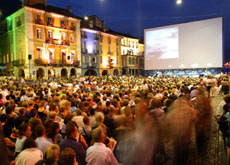Mr Cinema reveals his strategy

Nicolas Bideau, the new head of film at the Federal Culture Office, is hoping to boost Switzerland’s small film industry.
In an interview with swissinfo, “Mr Cinema”, who will be responsible for state subsidies for the sector, said he wanted to encourage more art films and a greater commitment from producers.
Bideau, the son of an actor and a director and currently head of the Foreign Ministry’s centre for foreign cultural policy, is due to take up his post on October 1.
His appointment comes after a troubled 12 months at the Federal Culture Office.
Last year both the director, David Streiff, and the head of film, Marc Wehrlin, resigned.
Streiff’s departure was mainly due to differences with Interior Minister Pascal Couchepin, who also holds the culture portfolio. Streiff has now been replaced by Jean-Frédéric Jauslin.
swissinfo: You are the son of an actor and a director, both of whom had distinguished careers. Why did you decide not to follow in their footsteps?
Nicolas Bideau: First of all, because I come from the very Calvinist Geneva, which made it difficult to follow that path. When I was young, I had two great passions: the cinema, or culture in general, and international relations. My second passion had nothing to do with my parents and to make a name for myself and for my own personal development, I decided to chose that one.
But this choice has allowed me to come back to my first love – a complete about-turn, but on a sound psychological basis.
swissinfo: Being an artist or director means living with uncertainty. That’s also the fate of many Swiss film-makers, even if they have won prizes and made successful films.
N.B.: It is true that it is difficult here in Switzerland. We do not have a film industry and the audience is restricted. We cannot rely on the market alone to regulate production so state intervention is essential, otherwise the German, French and Italian cinema industries would overwhelm our own. Moreover, the larger a country is, the greater the chances of finding talented people.
I think the way forward is to concentrate on a number of more talented film-makers and not just for one or two films, but over a longer period. This would also give a boost to the more popular and commercial aspects of Swiss cinema.
swissinfo: There is heated debate on this issue: whether or not a maker of a film which attracts large audiences should be rewarded with further funding.
N.B.: Our public funding structure is 80 per cent selective and we choose a project on the basis of a proposal made to us by a director or producer.
A further 20 per cent of the funding comes from what is referred to as “automatic subsidy”, for those films which have enjoyed greater commercial success and in some cases have not received the selective subsidy. I think that is right. In any case, we must give priority to art films, quality films, which are the lifeblood of the cinema.
swissinfo: Although Switzerland cannot afford a full-scale cinema industry, can it not at least hope for a revival through art films as has happened in Denmark?
N.B.: That is certainly one of my objectives. There are some similarities between German-speaking Switzerland and Denmark, because of the dialect factor. There is a special bond between an audience and its language. Films in Swiss-German dialect make it possible to reproduce a certain cultural identity.
The Danish funding system has supported art films which are successful with the public. This is the magic formula we need to aim for. Belgium is more like us because of its size and bilingualism. The “Palme d’Or” at the Cannes film festival this year went to the Belgian Dardenne brothers, who make straightforward films, on topics such as family or social relationships.
swissinfo: Do you think it would be valuable for Swiss directors to have other forums to make contacts apart from our film festivals?
N.B.: Some directors complain about the lack of contact with other directors and with audiences and the subsidy system. In my view, the point of contact should be the producer and we need to consider the role and quality of producers in Switzerland.
The producer should not only deal with the funding bodies, but should also play an editorial role. Far too many films do not make it to cinema screens, often because the producers do not do their job properly. Producers need to become more professional, more involved, investing in films themselves and playing a more active part.
swissinfo-interview: Raffaella Rossello
Nicolas Bideau was born in 1969.
His mother was a film director, his father the distinguished actor Jean-Luc Bideau.
He studied political science in Lausanne and Paris, as well as Chinese in Beijing.
In 1999 he embarked on a career as a diplomat with the Foreign Ministry.
In 2003 he assisted the then economics minister, Pascal Couchepin, during his year as Swiss president.
He then headed the Foreign Ministry’s centre for foreign cultural policy.
The system of public funding for the Swiss cinema, covering all stages of the production and promotion of a film, depends on credits allocated by parliament. This was set at about SFr23 million ($18 million) for 2004-2007.
The remainder – SFr12-15 million – comes directly from the Federal Culture Office’s cinema section.
In Switzerland, 5% of cinemagoers watched a Swiss-made film. In 2003, it was 6%.

In compliance with the JTI standards
More: SWI swissinfo.ch certified by the Journalism Trust Initiative











You can find an overview of ongoing debates with our journalists here . Please join us!
If you want to start a conversation about a topic raised in this article or want to report factual errors, email us at english@swissinfo.ch.